| All Artists: Ludwig van Beethoven, Johannes Brahms, Arturo Toscanini, Sergey Koussevitzky, Boston Symphony Orchestra, NBC Symphony Orchestra Title: Beethoven, Brahms: Violin Concertos Members Wishing: 0 Total Copies: 0 Label: Naxos Original Release Date: 1/1/1939 Re-Release Date: 7/18/2000 Album Type: Original recording remastered Genre: Classical Styles: Chamber Music, Forms & Genres, Concertos, Historical Periods, Classical (c.1770-1830), Modern, 20th, & 21st Century, Instruments, Strings Number of Discs: 1 SwapaCD Credits: 1 UPC: 636943193624 |
Search - Ludwig van Beethoven, Johannes Brahms, Arturo Toscanini :: Beethoven, Brahms: Violin Concertos
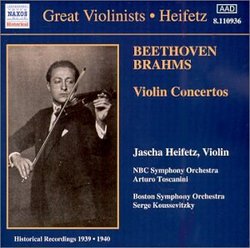 | Ludwig van Beethoven, Johannes Brahms, Arturo Toscanini Beethoven, Brahms: Violin Concertos Genre: Classical
During a career spanning six decades, Jascha Heifetz, surely one of the greatest violinists of all time, left a recorded legacy of an enormous repertoire, including solo pieces, sonatas, a lot of chamber music, and, of cou... more » |
Larger Image |
CD DetailsSynopsis
Amazon.com During a career spanning six decades, Jascha Heifetz, surely one of the greatest violinists of all time, left a recorded legacy of an enormous repertoire, including solo pieces, sonatas, a lot of chamber music, and, of course, all the famous violin concertos--from Baroque to the 20th century--some in several versions made many years apart with different orchestras and conductors. In addition to RCA's complete, 65-CD collection, there are many reissues of parts of his discography; this is a singularly felicitous coupling. Of two versions of each concerto, these are the earlier ones. Both performances are breathtaking in their effortless virtuosity, pristine perfection, aristocratic nobility, and elegance. And, of course, there is Heifetz's incomparable tone. Pure, never sweet or lush, with a focused, intense vibrato and infinite variety of nuance and inflection, it has a warm glow on the lower strings and a glorious radiance in the upper register that truly resembles the voices of angels in its soaring ecstasy. He plays Auer's fiendishly difficult cadenzas with stunning bravura; they are justifiably overshadowed by Joachim's and Kreisler's and rarely heard. The record shows that even an artist of Heifetz's stature and personality depends on the accompanying forces for successful self-expression. In the Beethoven, Toscanini's famous penchant for brisk tempi and strict, unbending rhythm sometimes results in superficiality and severely limits the soloist's freedom and flexibility, but Heifetz's charm and elegance make the Finale effervescent. By contrast, the Brahms under Koussevitzky is expansive, intense, urgent, dramatic, warm, fiery, and very free; the slow movement is inward, leisurely, and ecstatic, the Finale exuberant. The performance should lay to rest the image of Heifetz as a cold, impersonal player, an impression originally created by his restrained appearance on stage. --Edith Eisler Similarly Requested CDs
|
CD ReviewsHeifetz, Toscanini, and Koussevitzky Hermes Camacho | Boulder, CO | 01/25/2002 (5 out of 5 stars) "Heifetz's virtuosity shines in these early recordings of the Beethoven and Brahms violin concerto.The Beethoven was recorded with Arturo Toscanini and the NBC Symphony. Though I would generally agree that Toscanini favored the "correct tempi" over brisk tempi, that does not apply here. Heifetz's expressive capacity is limited by Toscanini's strict tempo. Though he favored this, Toscanini was first and foremost an opera conductor and had one of the most wonderful ears for rubato in accompanying a singer. So his inflexibility is quite surprising. By contrast, Koussevitzky's Brahms is much more expansive and expressive, which allows Heifetz to explore an enormous range of expression. Though Toscanini's adherence to tempo was quite alarming, he was the consummate master of interpreting Beethoven. That, coupled with another master Beethoven interpreter, made this recording of Beethoven's concerto memorable and powerful. The Brahms with Koussevitzky is dramatic and is quite a thrill to listen to. Heifetz was the greatest violinist to have lived and this recording, in his younger years, shows it." Classic performances from the greatest dm | rochester, ny | 12/08/2004 (5 out of 5 stars) "Heifetz was known as "the King of violinists" and called "God" by Perlman. On these recordings, it is easy to see why. These are historical recordings, made in 1939 and 1940, but have been restored brilliantly and Heifetz's playing is indescribable; at least by me, check out the review on the Gramophone site. The sound on the solos is excellent; of course there is some background hiss and popping, but it is minimal and should definitely not deter anyone from this masterpiece." Great transfer of excellent performances Harald Anderson | Washington, DC United States | 01/13/2009 (5 out of 5 stars) "I own these recordings on 78, 33 1/3, and now on CD. The reviewers before me have discussed the performances very well, so I'll focus on the transfer. The recordings maintain some pop and fizz, but don't have the revolving 78 rpm fizz that was the only mar in the LP version (although the adagio from the Beethoven has some). I also compared surface noise, and it indicated that the CD was made from different copies than those used to make the LP versions.
The transfer seems to have seen minimal correction - aside from the pops, instances where someone bumps a mic (e.g., 1:50 into the Brahms) and other facets that usually get unintentionally filtered out are clearly heard. The recording has tremendous clarity and brightness, and in these, it far exceeds the LP and almost matches the 78 - no small feat for transfers of this sort. The surface noise doesn't bother me - they are easily ignored by old and scholarly ears. If you're interested in crystal-clarity, you should look at the Reiner-Chicago and Munch-Boston recordings, even though the performances are not as great. These are my favorite Heifetz recordings. They were made with conductors who wanted to showcase the orchestra and orchestration in these pieces, not just the soloist. And Heifetz seems to have agreed with their vision, or at least tolerated it. The result is a fluidity and simple beauty that Heifetz never fully captured again, and that these two weighty, complex and intricate works have seldom seen since. Simplex munditiis, to quote Horace. The liner notes (by Tully Potter) seem to be new, and preserve some of the historical material (soloists in the orchestra, etc.)." |

 Track Listings (6) - Disc #1
Track Listings (6) - Disc #1
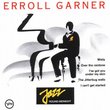
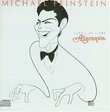


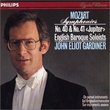
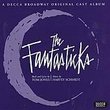
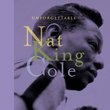

![Bizet: Carmen / Jessye Norman, Freni, Shicoff, Estes, Le Roux; Ozawa [Highlights]](https://nationalbookswap.com/cd//m/87/0887/6020887.jpg)